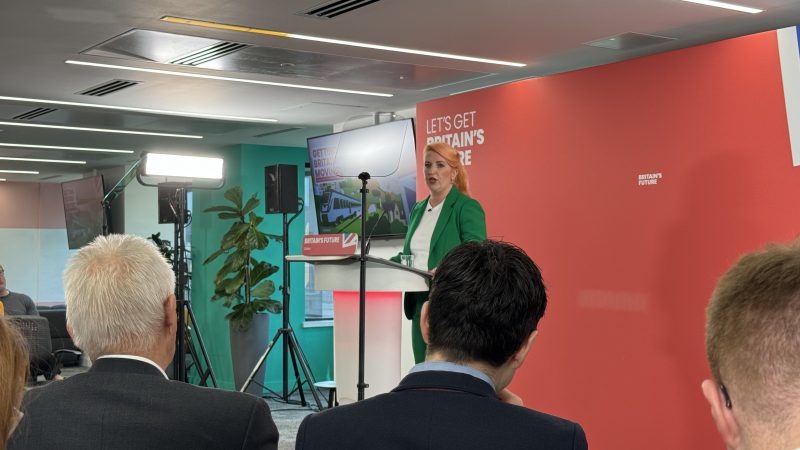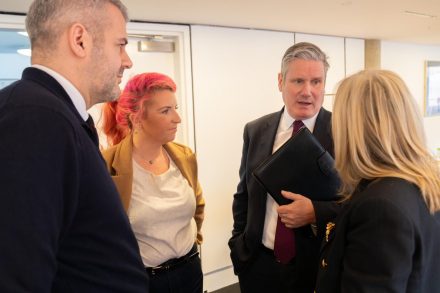
Silencing and cancelling – art and truth for Palestinians
Sally Hobbs reports on how public opposition and the collective action of artists got an important solidarity event reinstated.
On Monday 22nd April, Manchester’s central community arts venue, HOME, was host to a packed audience. They had gathered to listen to an evening of “Voices of Resilience” – readings from Palestinian poets and writers, with Palestinian music. Video links with readings from Maxine Peake and Jeremy Corbyn were broadcast alongside background video images of olives, skies and sea, as writers’ work was read out by a team of speakers.
The event was presented by publishers Comma Press as “an evening of writing from Gaza, marking the launch of Don’t Look Left: a diary of genocide, by Atef Abu Saif, with additional readings of work by Refaat Alareer, Hiba Abu Nada and others who have lost their lives in the current conflict. With guest appearances from Kamila Shamsie, Maxine Peake, Ahmed Nehad and others.”
This event was the successful end result of a shameful episode in HOME’s previous history of open access to dissident and diverse communities within the arts, which started when HOME announced the cancellation of the event at the start of the month due to “safety considerations”. It emerged that a lobby group – the Jewish Representative Council – had claimed that the Abu Saif was an “antisemite” and “holocaust denier” a claim repeated without evidence in an article by Manchester Evening News.
The letter sent by the JRC to HOME and published on their X account, referred to an article Abu Saif wrote on 22nd August 2022 in Al-Ayyam newspaper as evidence of this. Rather than denying the holocaust, he said the exact opposite: “Hitler’s crimes against humanity cannot be forgiven or tolerated. They may be unprecedented in history in terms of their ugliness… As Palestinians, this is a fact we have not denied and will never deny. We are a people who suffer injustice, massacres, killing and displacement. We cannot accept something similar that happened to others and say it is right.”
Comma press threatened legal action for defamation. HOME advised in a statement cancelling the event that it was due to “safety considerations” and that HOME was a “politically neutral space”. An article in The Mill, an independent online vehicle for local journalism, covered the background, citing the influence of some specific lobbyists including Ed Glinert, known locally for co-founding a local paper and as a tour guide, but whose influence appears at odds with his incendiary and entirely unfounded claims about the potential risks from pro-Palestine protesters rioting, and objections to the use of the word genocide. He was also apparently proud of his track record in claiming to have got the director of Whitworth Art Gallery sacked while lobbying for the cancellation of a previous prestigious art event in Manchester hosted there.
Atmospheric Memories, which included verified evidence of the use of white phosphorus and footage of the shooting of unarmed Gazans during the 2018 Great March of Return protests at the border with Israel, along with others internationally, was the focus at that time. In the end, exhibition was not cancelled following strong objections.
Meanwhile the opposition to Council- and Arts Council-funded HOME’s decision snowballed. Letters to the recently appointed Director of Home, Karen O’Neill, protests outside HOME and prominent local and national voices in opposition to the decision put escalating pressure on HOME. Hundreds of artists, including actress Maxine Peake and director Kapadia, a patron of HOME, also signed an open letter stating that the venue has “contributed to the silencing of Palestinian voices at a time when they most need to be heard.”
Just what was happening behind this, in terms of the decision-making of the board, of funders and sponsors? Manchester City Council has a very direct responsibility for the venue and will have also been influential. We continue to call for transparency and accountability for the decision-making process.
The final humiliation for HOME was when over 100 artists and their supporters took down around 70 of the 500 artworks in the biennial regional Open art exhibition, with more set to follow. In place of the absent artworks, copies of a statement signed by over 150 artists were put up, calling for an apology from HOME and the reinstatement of the “Voices of Resilience” event, alongside other demands such as facilitating a forum for “Palestinians and their allies” to air concerns. Photos of artists walking out with their work were reproduced in the local and national press.
The day after this, HOME published a carefully worded statement acknowledging “the upset and distress caused” and confirming the exhibition’s reinstatement.
So Monday night’s event felt particularly important in the face of the continuing battle for the right of Palestinians to be heard. The nerves of HOME were still evident: I have never attended anything there before where every ticket holder was contacted personally beforehand to be advised that they would have bag searches and ID checks and on no account must they call out, wear or carry flags, symbols or other indicators of Palestine solidarity.
But once through a largely friendly security check, there was a real sense of a shared experience. It was a powerful evocation of the Palestinian experience of displacement, longing for home, being unheard. And at its centre was a series of extracts from a journal written daily of his first-hand experience of living in Gaza through the first three months of the Israeli invasion and bombing of Gaza after October 7th, by internationally acclaimed Palestinian writer, Atef Abu Saif. Inevitably, this was a hard listen, read perfectly by actor Kingsley Ben-Adir although often needing a pause to enable him to continue.
The evening was introduced by Basma Ghalayani, from Comma Press, starting with her welcome of “Well, we made it here!” She introduced the evening as one that had originally been aimed at providing a space for the Palestinian community in the region and for their supporters, and to launch Abu Saif’s book, who she said “was luckier than most” – he got out – but that only goes to define how terrible others’ experiences of ordinary life in Gaza has been and continues to be. It certainly achieved its intention and cemented for me the critical importance of sharing this experience and telling others the truth about the genocide that is continuing.
Nationally and locally we continue to battle for the truth to be told and not to allow defamatory claims of antisemitism to derail genuine humanitarian stories of what is happening. The murder of journalists and photo-journalists in Gaza, the news blackouts and lack of internet access, all tell to the scale of Israel’s need to control the narrative.
HOME’s experience is also testimony to the support of artists. Art is never conducted in a political vacuum and it is indeed vacuous to say so.
Sally Hobbs is a Palestine supporter and activist in Manchester.
Image: Ceasefire protest in Colchester, April 20th, c/0 BH Griffiths.







